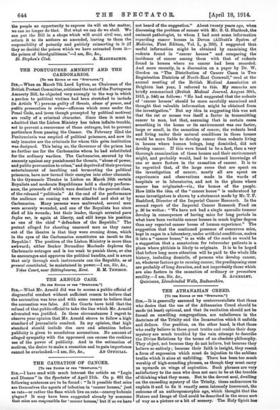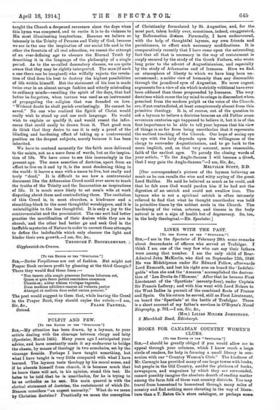THE ATHANASIAN CREED.
[To ram EDITOR or ens "Sescraroe."] Sin,—It is generally assumed by controversialists that those who desire that the use of the Athanasian Creed should be made (at least) optional, and that its recitation should not be forced on unwilling congregations, are unbelievers in the doctrines of the Trinity and the Incarnation which it unfolds and defines. Our position, on the other hand, is that those who really believe in these great truths and realize their deep mystery are much troubled by the vain attempt to describe the Divine Relations by the terms of an obsolete philosophy. They object, not because they do not believe, but because they believe so entirely ; because their• faith is insight, they resent a form of expression which must do injustice to the sublime truths which it aims at unfolding. There has been too much worship of high-sounding phrases, as though they must carry us upwards on wings of aspiration. Such phrases are very satisfactory to the man who does not care to be at the trouble of thinking what they mean. But to the devout soul, dwelling on the exceeding mystery of the Trinity, these endeavours to explain it and to fix it exactly seem intensely irreverent, the outcome of an anthropomorphic age, which thought that the Nature and Image of God could be described in the same sort of way as a picture or a bit of scenery. The Holy Spirit has
taught the Church a deepened reverence since the days when this hymn was composed, and to recite it is to do violence to His most illuminating inspirations. Because we believe so intensely in the Trinity of Persons and Unity of God, because we see in the one the inspiration of our social life and in the other the fountain of all real adoration, we resent the attempt of an ever-defining age to obscure the Eternal Truth by describing it in the language of the philosophy of a single period. As to the so-called damnatory clauses, we are quite aware that they may be rightly interpreted. The man (if such a one there can be imagined) who wilfully rejects the revela- tion of God does his best to destroy the highest possibilities of life within himself. But the statement of his loss is made twice over in an almost savage fashion'and utterly misleading to ordinary minds—recalling the spirit of the days, that had better be forgotten, when torture was used as an instrument of propagating the-religion that was founded on love. "Without doubt he shall perish everlastingly. He cannot be saved." No one who realized the Spirit of Christ would really wish to stand up and use such language. He would wish to explain or qualify it, and would resent the infer- ences that could easily be drawn from it. That good men do think that they desire to use it is only a proof of the blinding and hardening effect of taking up a controversial position on the deepest subjects, merely because it has been inherited.
We have to contend earnestly for the faith once delivered to the saints, not as a mere form of words, but as the inspira- tion of life. We have come to see this inoreasingly in the present age. The mere assertion of doctrine, apart from an effort to live on it and by it, is the most deadening thing in the world: it leaves a man with a name to live, but really and truly "dead." It is difficult to see how a controversial document like the Athanasian Creed could ever serve to teach the truths of the Trinity and the Incarnation as inspirations of life. It is much more likely to set men's wits at work disputing about them and contradicting them. The recitation of this Creed is, in most churches, a hindrance and a stumbling-block to the most thoughtful worshippers, and it is unintelligible to the less thoughtful. It is only a joy to the controversialist and the precisionist. The one sort bad better practise the mortification of their desires while they are in church,' and the other bad better go and seek God in the ineffable mysteries of Nature in order to correct those attempts to define the indefinable which only obscure the light and hinder their own growth.—I am, Sir, Ste.,











































 Previous page
Previous page